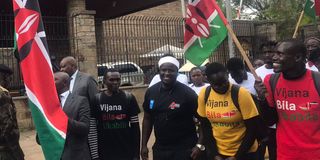Thank you for peaceful elections, youth say in Eldoret to Mombasa walk

Vijana Bila Ukabila youths during their flag off as they start the second part of their walk from Nairobi to Mombasa.
A group of young people called Vijana Bila Ukabila have started a peaceful 820km walk from Eldoret to Mombasa in solidarity with the National Cohesion and Integration Commission (NCIC) to thank Kenyans for conducting peaceful elections.
Bearing the message of “One Kenya, one people, one country”, the youths started their walk on November 16, arriving in Nakuru on November 24.
Four days later, they arrived in Nairobi, where they were flagged off to Mombasa by a representative of the Nairobi county commissioner.
Julie Korir, the group’s secretary said they are trying to beat the ethnic odds so that Kenyans can come together and work as a country without seeing each other’s tribes.
“We want to thank Kenyans for conducting a peaceful election on August 9, and this is a thanksgiving to all the Kenyans,” Ms Korir said.
“It is not easy walking from Eldoret to here, but what is fulfilling is how Kenyans are receiving us and encouraging us to continue preaching peace in the country.”
Previous elections in Kenya were followed by political violence, with thousands of people killed and hundreds of thousands of others displaced from their homes after disputed presidential polls in 2007, for example.
Steven Omondi, chairman of the peace initiative, said long gone are the days when young people were used to cause violence, urging his peers not to be involved in violence.
“Our main agenda was to spread peace and bring the country together, but today we want to thank Kenyans for coming together and holding peaceful elections,” Mr Omondi said.
“Last year, we came together, walked the same distance and preached peace months before the election, and we are here again to say thank you.”
The return of multiparty democracy to Kenya in 1992 led to the ethnicisation of politics, with parties coalescing around tribal power brokers and an ever-changing political landscape as inter-ethnic alliances were formed and fell apart.
This continues to characterise Kenya’s electoral landscape today. In the absence of parties based on a consistent political ideology, tribal identities and manipulation of ethnic grievances remain the primary basis of political mobilisation, with the threat of violence – and often its use – hanging over every election cycle.
The March 2018 handshake between former President Uhuru Kenyatta and his political opponent at the time, Raila Odinga, was intended to signal an end to the acrimony that followed the 2017 presidential elections.
The truce was hailed as a landmark in the Building Bridges Initiative (BBI), which sought to lay the foundations for national healing, including pledges to end historical and electoral injustices and unite Kenyans, before the courts declared the BBI illegal.





